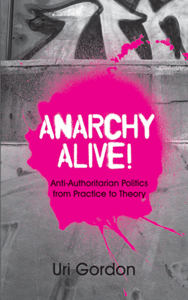Top Qs
Timeline
Chat
Perspective
Anarchy Alive!
2007 book by Uri Gordon From Wikipedia, the free encyclopedia
Remove ads
Anarchy Alive!: Anti-Authoritarian Politics from Practice to Theory is a book by Uri Gordon that investigates anarchist theory and practice.[1] An expanded reworking of the author's PhD thesis at the University of Oxford, the book was released by Pluto Press, a London-based radical publisher, in November 2007.[2][3] It is presented as "an anarchist book about anarchism",[2] and assumes some background knowledge and sympathy for anarchism on the part of the reader.[4] Gordon considers his approach in the book to have many commonalities with that of anthropologist David Graeber, author of Fragments of an Anarchist Anthropology.[5]

Remove ads
Contents
Anarchy Alive! was not designed to further debates about the finer points of anarchist theory within academia, nor as a history of ideas, but rather to serve as a tool for activists trying to engage with theory—leading anarchist scholar Alex Prichard to characterise it as "a user’s manual for anarchist activism".[6] It is divided into six chapters, addressing anarchism as a political culture, anarchism as an ideology, anarchist forms of organisation and power, anarchism and violence, anarchism and technology, and anarchism and nationalism (through the case study of the Israeli–Palestinian conflict).[2]
Remove ads
Reception
Anarchy Alive! was favourably reviewed in journals including Anarchy: A Journal of Desire Armed, New International and Anarchist Studies.[1][6][7][8][9][3] Reviewing the book in Anarchist Studies, Alex Prichard predicted that "not only will Anarchy Alive! become required reading in the anarchist movement, but it will have a sizeable impact on the academy … this will be a defining text in anarchist circles for the next few years at the very least".[6] Richard Swift, in a review for New International, called the book "a short and thoughtful account", and granted it a four-out-out-of-four star rating.[4] The CrimethInc. collective recommended the work for its analysis of power and authority in an anarchist context.[10] Freedom reviewer Tom Jennings dissented, calling into question the theoretical coherence of the book.[11] Another critical view came from the Socialist Standard, which although conceding that the book was "well-written and can be read on a know-your-opponent basis", denounced the book for its anarchist critique of representative democracy.[12]
Remove ads
See also
Citations
References
External links
Wikiwand - on
Seamless Wikipedia browsing. On steroids.
Remove ads

